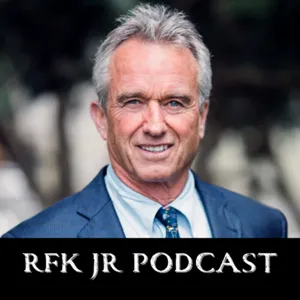Podcast Summary
Western states face a crisis as Colorado River's water levels drop: Western states, home to 40 million people, are struggling to reduce water usage from the Colorado River due to a prolonged drought. The situation is dire, with the potential for man-made reservoirs to reach 'dead pool' levels, disrupting water supplies, hydropower production, and flood control.
The Colorado River, which provides water to approximately 40 million people in 7 western states, is facing a severe crisis due to a prolonged drought. The river's annual flow is decreasing, and efforts by the states and federal government to reduce water usage have not been successful. The situation has become so dire that the federal government has given the states a deadline to make significant cuts, but they have failed to reach an agreement. If the states do not reduce their water usage, the man-made reservoirs, including Lake Mead, could reach a "dead pool" level, causing the entire system to crash and potentially disrupting water supplies, hydropower production, and flood control. The deadline for the second round of negotiations was January 31, 2023, and it appears unlikely that a deal will be reached. The consequences of not reaching an agreement could be severe, including power outages and water shortages.
Western US Faces Uncertain Water Future Due to Colorado River Basin Crisis: The Colorado River Basin crisis, exacerbated by climate change, is causing uncertainty in water flow and threatening Deadpool status for major reservoirs, putting downstream states at risk of water shortages.
The Western United States is facing a significant water crisis due to the drying up of major reservoirs in the Colorado River Basin. This issue is compounded by the fact that the relationship between snowpack and water flow into rivers, which was once predictable, is now uncertain due to climate change. As a result, it's difficult to determine when the reservoirs will reach "Deadpool" status, when there's not enough water for it to pass through dams, leaving downstream states like California, Arizona, and Nevada without their main sources of drinking water and irrigation. The situation is dire, with lake levels reaching record lows and revealing previously submerged objects and even bodies. The government and states are working to avoid Deadpool, but the unpredictability of the situation makes it a pressing concern for the near future. The models used to predict water levels are no longer reliable, adding to the urgency of finding solutions.
Water crisis in the western US due to inaccurate assumptions in the Colorado River Compact: The Colorado River Compact, signed in 1922, allocated water to western US states based on inaccurate assumptions, leading to a water crisis due to population growth and climate change. Upper basin states are particularly affected as they rely on natural stream flow and see reduced water supplies.
The western United States is facing a water crisis due to a deal made a century ago that was based on inaccurate assumptions about water availability. The Colorado River Compact, signed in 1922, allocated water to various states based on the assumption that 17.5 million acre-feet of water would be available annually. However, this number has consistently been below the actual flow, and the situation has worsened due to population growth and climate change. As a result, the upper and lower basin states are now at odds over how to allocate the shrinking water supply. The upper basin states, which include Colorado, New Mexico, Utah, and Wyoming, are particularly hard-hit as they rely more on natural stream flow and have seen a significant reduction in water reaching them. The situation is untenable, and the deal's foundations are crumbling under the pressure of increasing demands and decreasing supplies.
Battle of ideas: California vs Arizona: California prioritizes senior water rights, while Arizona focuses on practicality and fairness in Colorado River water dispute
The dispute over reducing water use from the Colorado River is essentially a battle between two ideas represented by California and Arizona. California, which uses the most water, primarily relies on its senior water rights and argues that it should not bear the brunt of the cuts before others do. On the other hand, Arizona, which also uses a significant amount of water, emphasizes practicality and fairness, despite having weaker legal arguments. The states' positions reflect their unique circumstances and philosophies, highlighting the complexity of finding a solution to the water crisis.
Water dispute between Arizona and California: Both Arizona and California face significant challenges in resolving their water dispute, with each side arguing for their interests and the federal government needing to intervene in order to settle the issue and prevent potential legal battles.
The ongoing water dispute between Arizona and California is a complex issue with valid arguments on both sides. Arizona argues that cutting their water supply would cause significant harm to cities and tribes, while California questions the wisdom of building cities in desert areas with an uncertain water supply. The negotiations have been intractable due to the severe consequences each side would face in accepting a deal. The federal government has attempted to broker a deal but has been unable to get states to agree on a plan by the deadline. Now, the federal government must create a plan of its own to prevent the risk of a dead pool and potential legal battles. The distribution of water cuts remains uncertain, but it's clear that both states will face significant challenges in addressing this issue.
Water crisis worsens in western US, affecting farmers, cities, and tribes: Farmers in California face water shortages, cities explore new sources, Arizona communities face hardship
The water crisis in the western United States, particularly in California, Arizona, and Southern California, is expected to worsen, leading to difficult decisions for farmers, cities, and tribes. Some farmers in California may not have enough water to irrigate their crops, forcing them to let fields go fallow. Cities in Arizona and Southern California will need to become even more water-efficient and explore new sources of water, such as recycling, desalination, or piping water in from other areas. Communities in Arizona, in particular, will see their water access decrease, causing significant hardship. The situation may prompt drastic, risky strategies to secure water, echoing the efforts made a century ago when the west faced similar challenges. The natural allure of the region may compel people to find ways to make it livable despite the increasing costs. Other news includes the fallout from the violent beating of Tyre Nichols by police in Memphis, and a powerful bombing at a mosque in Pakistan, killing at least 60 people and injuring over 150.





